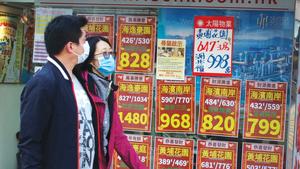 Masked pedestrians walk by a real estate agency’s window filled with classifieds in Kowloon City district, Hong Kong, on Monday. (EDMOND TANG / CHINA DAILY)
Masked pedestrians walk by a real estate agency’s window filled with classifieds in Kowloon City district, Hong Kong, on Monday. (EDMOND TANG / CHINA DAILY)
Hong Kong’s skyrocketing property market is showing signs of slowing down, with the value of all properties changing hands last month sliding 17 percent on a monthly basis to HK$29 billion (US$3.7 billion), while the number of transactions dwindled to 3,776 from 3,908 a month earlier — a 13-month low — according to the Land Registry.
Meanwhile, the number of private residential units completed in 2019 plummeted 35 percent to 13,600 from a year ago — the lowest number since 2015 — data from the Transport and Housing Bureau shows.
Demand from home starters, like those from new marriages, is still strong. Given the new lending policy, it has also induced some homeowners to buy bigger flats to improve the quality of living.
Cliff Tse, senior director of valuation advisory services at Jones Lang LaSalle Hong Kong
According to Bloomberg Intelligence, Sun Hung Kai Properties — the city’s biggest developer — completed 3,264 units in the SAR last year, the most among local builders. It’s followed by Henderson Land Development with 2,803 units and Wheelock and Company with 1,600. CK Asset Holdings only completed the construction of Harbour Glory in North Point with 378 apartments last year, while Sino Land Company and Kerry Properties did not have any residential project completed in 2019.
ALSO READ: Home construction pace slows down in HK
Developers will put off launching primary new projects in the next two months until the epidemic outbreak retreats. Real estate agents also expect activity in the secondary market to slow as inspections would be reduced as part of efforts to contain the disease.
Developers may have also slowed the pace of construction, wary of a proposed vacancy tax by the government on completed but unsold residential units.
The official price index for private domestic units dipped by almost 1.7 percent to 378.5 in December from the previous month, the largest fall in three months, after a monthly gain of 1.85 percent in November, when the government relaxed mortgage restrictions, according to the Rating and Valuation Department. Local home prices still gained 5.3 percent in 2019.
Analysts warned that the city’s residential home prices will be dented by the coronavirus outbreak in the first half of this year, while home transactions and price growth will be primarily driven by the secondary market.
“Should the uncertainties arising from the local political situation and trade talk hurdles continue, we expect the impact on Hong Kong’s to be more acute by mid-2020. That will weigh on the home sales volumes and pricing, with the sales volume at a level similar to last year’s fourth quarter in the January-March period, and home prices dropping by 10 to 15 percent in first half of this year.” Cushman and Wakefield’s Vice-President and Head of Consulting for Greater China Alva To warned.“Some homeowners are desperate to slash asking prices in a bid to sell their properties as the novel coronavirus outbreak has crimped market sentiment. Moreover, major developers did not launch large-scale residential projects during the Lunar New Year holiday, and this has also drawn homebuyers’ attention to the secondary market,” said Willy Liu, chief executive officer of Ricacorp Properties.
Property investment advisory firm Real Capital Analytics said it expects residential home investment in Hong Kong to moderate further in the first half of this year, and investment activities in the residential home sector for 2020 to be far fewer than the long-term average level.
“Investment activities in the residential property sector were extremely buoyant in 2017-18, and this trend will be difficult to sustain from a long-term perspective, because the size of commercial property inventories in Hong Kong is not huge compared to other cities,” RCA said in a research report.
Real estate analysts, nevertheless, are still confident that the city’s home prices will continue to be resilient in the long run.
The impact of the China-United States trade frictions and the local social unrest on Hong Kong’s property sector has largely waned, and this could result in a spate of property transactions after the negative factors have run their course in the first quarter.
The local residential home market will be driven by secondary home sales, thanks to the current low interest rate and the SAR government’s move to raise the mortgage cap to stimulate home sales.
In October, the government raised the mortgage cap to 90 percent for homes valued at up to HK$8 million. For flats valued at up to HK$10 million, the cap was raised to 80 percent. This means first-home buyers will be able to buy more expensive flats with a down payment of 10 to 20 percent.
READ MORE: HK home prices see sharpest decline in 3 months in December
“Demand from home starters, like those from new marriages, is still strong. Given the new lending policy, it has also induced some homeowners to buy bigger flats to improve the quality of living,” argued Cliff Tse, senior director of valuation advisory services at Jones Lang LaSalle Hong Kong.
“Hong Kong’s secondary home prices could withstand pressures this year from a weakening economic outlook, the city’s social unrest and the novel coronavirus outbreak. Major developers are unlikely to slash prices for new homes in the mass market due to limited supply and their strong balance sheets,” predicted Patrick Wong, Asia Real Estate’s senior research analyst at Bloomberg Intelligence.
Contact the writer at oswald@chinadailyhk.com


